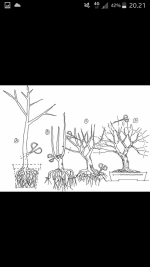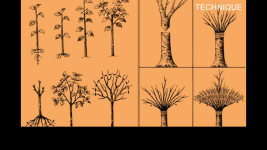raffaelbaer
Mame
After reading trough some of the Broom style creation threads here on Bnut, I wanted to try myself.
I've found some great inspiration from @Eric Schrader , he has a naturalistic Zelkova Broom, I really havent really seen before other than on some of @Walter Pall 's trees:

Wanting to get my project looking similar too this, I wonder, if what of these two options would be best to trunk chop in a few years:
Do a clean horizontal cut, select 2-3 branches, and let them grow out as subtrunks.
Do the same horizontal cut, and selecting 2-3 branches and then notching / carving the trunk out, like discribed in japanese books and magazines.
What wil the notching exactly do, and will it help me create realistic looking subtrunks?
I though of it as a similar technique as carving out the center hardwood, described in some threads here, which directs the callus swelling inwards (together with the clamp method).
@Eric Schrader , maybe if you've got some Input for me on how you did this tree, it would be amazing!
I assume, your Zelkova had a natural split, and you grew it out like that?
My cherry will have a lot of growing to do (beeing at 2cm trunk diameter), when wanting a finished 35cm ~ 14 inch tree, with a trunk diameter of arround 5cm ~ 2 inches, for a good trunk / height ratio.
Hopefully any of you can help me sort the process out, for creating a nice naturalistic Broom like Eric's
Cheers
Raffael
I've found some great inspiration from @Eric Schrader , he has a naturalistic Zelkova Broom, I really havent really seen before other than on some of @Walter Pall 's trees:

Wanting to get my project looking similar too this, I wonder, if what of these two options would be best to trunk chop in a few years:
Do a clean horizontal cut, select 2-3 branches, and let them grow out as subtrunks.
Do the same horizontal cut, and selecting 2-3 branches and then notching / carving the trunk out, like discribed in japanese books and magazines.
What wil the notching exactly do, and will it help me create realistic looking subtrunks?
I though of it as a similar technique as carving out the center hardwood, described in some threads here, which directs the callus swelling inwards (together with the clamp method).
@Eric Schrader , maybe if you've got some Input for me on how you did this tree, it would be amazing!
I assume, your Zelkova had a natural split, and you grew it out like that?
My cherry will have a lot of growing to do (beeing at 2cm trunk diameter), when wanting a finished 35cm ~ 14 inch tree, with a trunk diameter of arround 5cm ~ 2 inches, for a good trunk / height ratio.
Hopefully any of you can help me sort the process out, for creating a nice naturalistic Broom like Eric's
Cheers
Raffael
Last edited:




